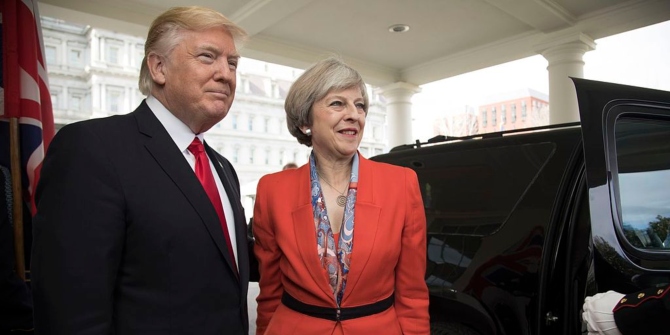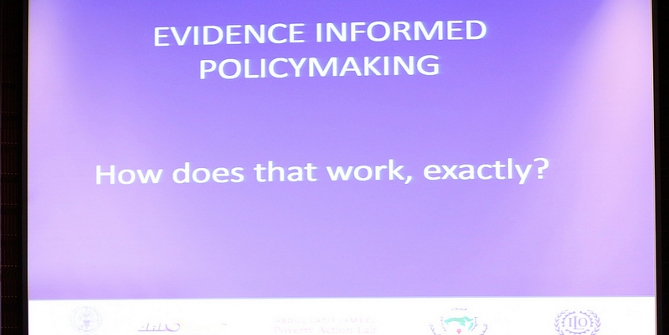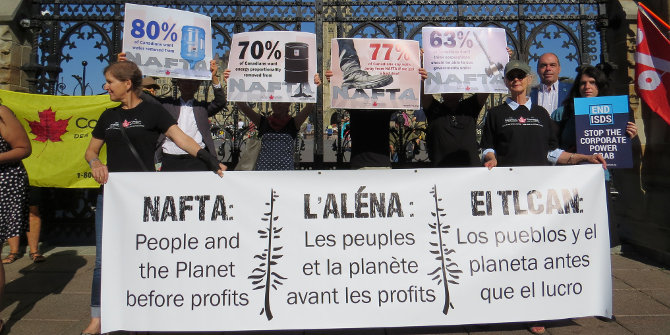 As UK Prime Minister Theresa May meets with President Trump today, LSE US Centre Director, Peter Trubowitz writes that while May will be aiming to use the visit to show that she has set the UK on a strong pro-Brexit path, she could also come away from it with the country looking like a pawn in Trump’s wider international strategy.
As UK Prime Minister Theresa May meets with President Trump today, LSE US Centre Director, Peter Trubowitz writes that while May will be aiming to use the visit to show that she has set the UK on a strong pro-Brexit path, she could also come away from it with the country looking like a pawn in Trump’s wider international strategy.
When Theresa May and Donald Trump meet later today at the White House, each one will be looking to achieve specific foreign policy goals.
For May, the visit serves two key objectives. First, it is designed to offset London’s loss in prestige and influence in Europe following last year’s vote to leave the EU. London needs stronger ties with Washington to compensate for its badly damaged relationship with European capitals. Second, for May the visit can help strengthen her claim that she has Britain on a realistic post-Brexit path. In this regard, the promise of a trade deal with the US would also arguably strengthen her hand in her negotiations with Brussels over the terms of disengagement from the EU.
Is the visit risky for May? You bet. She could come off looking like she is willing to bargain away long held British foreign policies, though she went some distance yesterday to ease those fears in her meeting with congressional Republicans in Philadelphia. More fundamentally, in her desire to secure a bilateral trade deal with the US, the UK Prime Minister could come away from her visit with London looking like a pawn in larger Washington gambit, which brings us to Mr. Trump.

For Trump, the May’s visit also serves two important international purposes. First, by improving relations with London, and cutting a trade deal, he can show that bilateralism pays dividends. Bilateralism is a core element of Trump’s approach to world affairs. He hammered home the point throughout the presidential campaign and one of his first executive orders this week was to pull out of the Trans Pacific Partnership Treaty (TPP). Second, by putting US relations with the UK on firmer footing, especially were it to include a bilateral trade deal, Trump can hope to gain leverage in his dealings with Europe over trade and security matters.
Are there downside risks for Trump? Yes, even if they are not as great as May’s. The main thing Trump has to avoid is the appearance of failure — usually a low bar for carefully choreographed state visits, but this one was off and on up until a week ago. Trump’s presidency hangs much more on public perceptions of competence than many realise. Americans may want change, but they also want competent leadership. And as George W. Bush and Jimmy Carter can attest, Americans can turn very quickly against a president when they don’t think they’re getting it.
Featured image credit: Chatham House (Rt Hon Theresa May MP, Home Secretary, UK) [CC BY 2.0], via Wikimedia Commons.
Please read our comments policy before commenting
Note: This article gives the views of the author, and not the position of USAPP– American Politics and Policy, nor of the London School of Economics.
Shortened URL for this post: http://bit.ly/2kaER8o
______________________
 Peter Trubowitz – LSE US Centre
Peter Trubowitz – LSE US Centre
Peter Trubowitz is Professor and Head of International Relations, and Director of the LSE’s US Centre. His main research interests are in the fields of international security and comparative foreign policy, with special focus on American grand strategy and foreign policy. He also writes and comments frequently on US party politics and elections and how they shape and are shaped by America’s changing place in the world.






